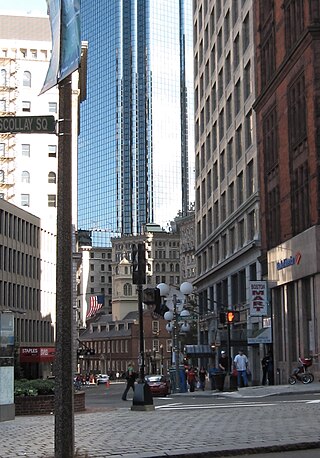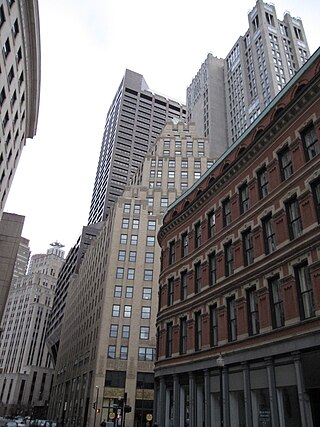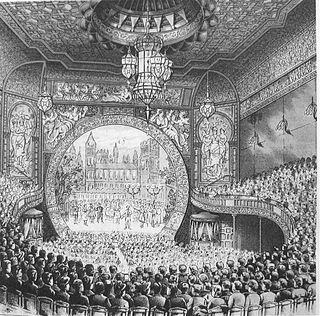Images
- Boston Theatre street view, ca.1854
- Interior, ca.1850s
- Macbeth at the Boston Theatre, 1850s
- Detail of 1869 map of Boston, showing Boston Theatre on Washington Street
- Advertisement, 1899
The Boston Theatre was a theatre in Boston, Massachusetts. It was first built in 1854 and operated as a theatre until 1925. Productions included performances by Jean de Reszke, Italo Campanini, Thurlow Bergen, [1] Charles A. Bigelow, [2] Edwin Booth, [3] Anna Held, [2] James O'Neill [1] Jennie Kimball, Christine Nilsson and others.

The Boston Museum (1841–1903), also called the Boston Museum and Gallery of Fine Arts, was a theatre, wax museum, natural history museum, zoo, and art museum in 19th-century Boston, Massachusetts. Moses Kimball established the enterprise in 1841.

The Hollis Street Church in Boston, Massachusetts, was a Congregational and Unitarian church. It merged with the South Congregational Society of Boston in 1887.

The Melodeon was a concert hall and performance space in 19th-century Boston, Massachusetts, located on Washington Street, near West Street. Musical concerts, lectures, sermons, conferences, visual displays, and popular entertainments occurred there.

The Federal Street Theatre (1793–1852), also known as the Boston Theatre, was located at the corner of Federal and Franklin streets in Boston, Massachusetts, United States. It was "the first building erected purposely for theatrical entertainments in the town of Boston."

Court Street is located in the Financial District of Boston, Massachusetts. Prior to 1788, it was called Prison Lane (1634–1708) and then Queen Street (1708–1788). In the 19th century it extended beyond its current length, to Bowdoin Square. In the 1960s most of Court Street was demolished to make way for the construction of Government Center. The remaining street extends a few blocks, near the Old State House on State Street.

Franklin Street is located in the Financial District of Boston, Massachusetts, United States. It was developed at the end of the 18th century by Charles Bulfinch, and included the now-demolished Tontine Crescent and Franklin Place.

The Castle Square Theatre (1894–1932) in Boston, Massachusetts, was located on Tremont Street in the South End. The building existed until its demolition in 1933. The theatre was the Boston home of Henry W. Savage's Castle Square Opera Company, a touring opera company which had theaters in other cities like Chicago and New York City, but took its name from the Boston theatre.
Beethoven Hall (1874–78) was an auditorium in Boston, Massachusetts, that hosted musical performances and other entertainments in the 1870s. It sat on Washington Street, near Boylston Street, in today's Boston Theater District/Chinatown neighborhood. The architect was William Washburn, who had also designed the first National Theatre and the second Tremont Temple.

The Park Theatre (est.1879) was a playhouse in Boston, Massachusetts, in the late 19th and early 20th centuries. It later became the State cinema. Located on Washington Street, near Boylston Street, the building existed until 1990.

The Globe Theatre (est.1871) was a playhouse in Boston, Massachusetts, in the 19th century. It was located at 598 Washington Street, near the corner of Essex Street. Arthur Cheney oversaw the Globe until 1876. From 1871 to 1873 it occupied the former theatre of John H. Selwyn. After a fire in May 1873, the Globe re-opened on the same site in December 1874. Architect Benjamin F. Dwight designed the new building. From 1877 to 1893 John Stetson served as proprietor; some regarded him as "a theatrical producer with a reputation for illiteracy in his day such as Samuel Goldwyn has achieved" in the 1960s. The theatre burned down in January 1894.

The Columbia Theatre or Loew's New Columbia Theatre in Boston, Massachusetts, was a playhouse and cinema located in the South End at No. 978 Washington Street. Charles Frohman, Isaac Baker Rich and William Harris oversaw the theatre until 1895. Owners included J.J. Grace of New York and Loews. Staff included Harry Farren, Saul Hamilburg and Philip Shea. The Columbia existed until its demolition in 1957.
The Grand Opera House (est.1888) of Boston, Massachusetts, was a theatre in the South End. Architect George Snell designed the 2,600-seat building on Washington Street. Managers and proprietors included Proctor & Mansfield, A.H. Dexter, George W. Magee, and Stair & Wilbur. Performances included Glyn's Three Weeks.

Selwyn's Theatre (1867–1870) of Boston, Massachusetts, was established by British-born actor John H. Selwyn. Architect Benjamin F. Dwight designed the building. Personnel included Dexter H. Follet, Arthur Cheney, H.A. M'Glenen, Charles R. Thorne Jr., and Charles Koppitz. In 1871 Selwyn's was renamed the "Globe Theatre."
The Palace Theatre (ca.1891-1931) of Boston, Massachusetts, United States, was a variety theatre on Court Street in the late 19th and early 20th centuries. Acts which performed there included Rose Hill Folly Co., Clifford & Dixon, Murry & Murry, Behler & Stone, and the Adamless Eden Burlesquers. It also showed photo-plays such as The Exploits of Elaine, The Master Key, and "Charles Chaplin comedies." Among its managers and proprietors were William Austin, F. J. Pilling, George Milbank, and Dunn & Waldron. The Palace occupied the building of the former Nickelodeon. It existed until 1931, when it was demolished.
The RKO Boston Theatre was a movie theatre in Boston, Massachusetts, located at 616 Washington Street, near Essex Street in the Boston Theater District. It opened as the Keith-Albee Boston Theatre on October 5, 1925.
The St. James Theatre (1912–1929) of Boston, Massachusetts, was a playhouse and cinema in the Back Bay in the 1910s and 1920s. It occupied the former Chickering Hall on Huntington Avenue near Massachusetts Avenue, adjacent to Horticultural Hall. For some years Loew's theatre chain oversaw the St. James. In 1929 the theatre "became part of the Publix (Paramount) chain, and was renamed the Uptown."

The Bijou Theatre (1882–1943) in Boston, Massachusetts, occupied the second floor of 545 Washington Street near today's Theatre District. Architect George Wetherell designed the space, described by a contemporary reviewer as "dainty." Proprietors included Edward Hastings, George Tyler, and B.F. Keith. Around the 1900s, it featured a "staircase of heavy glass under which flowed an illuminated waterfall." The Bijou "closed 31 December 1943 and was razed in 1951." The building's facade still exists. It is currently a pending Boston Landmark by the Boston Landmarks Commission.

Horticultural Hall (1845-1860s) of Boston, Massachusetts, stood at no.40 School Street. The Massachusetts Horticultural Society erected the building and used it as headquarters until 1860. Made of granite, it measured "86 feet in length and 33 feet in width ... [with] a large hall for exhibitions, a library and business room, and convenient compartments for the sale of seeds, fruits, plants and flowers." Among the tenants: Journal of Agriculture; Azell Bowditch's seed store; and Morris Brothers, Pell & Trowbridge minstrels.

The Boston Evening Traveller (1845–1967) was a newspaper published in Boston, Massachusetts. It was a daily newspaper, with weekly and semi-weekly editions under a variety of Traveller titles. It was absorbed by the Boston Herald in 1912, and ceased publication in 1967.
The following is a timeline of the history of Somerville, Massachusetts, US.